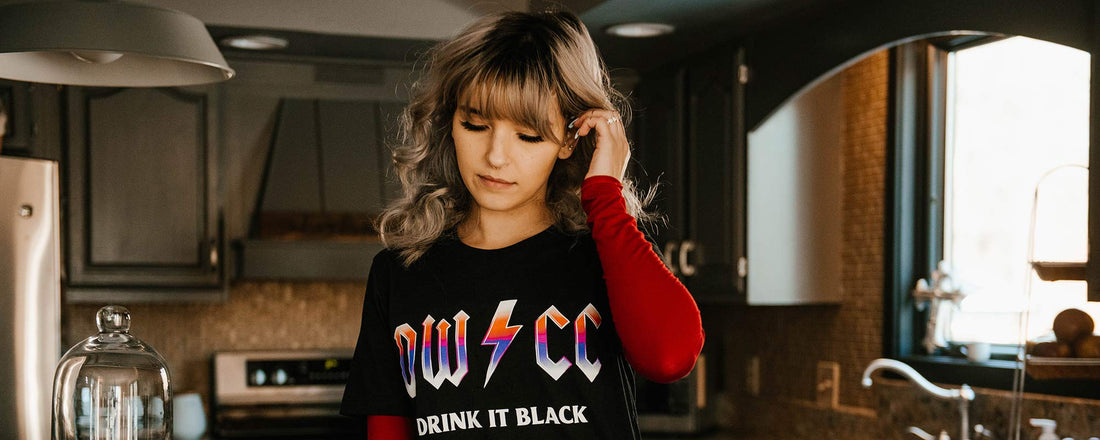
The Truth About Caffeine and Anxiety
Coffee TalkDoes Coffee Cause Anxiety?
Caffeine is a psychoactive drug that, according to research, can cause or enhance anxiety and other stress-related signs and symptoms in several ways. While the aroma, the taste, the routine, the warmth of the mug in your hands and the feeling you get when you take your first sip in the morning may be cause for celebration—sometimes too much of a good thing can cause problems.
Even those with a high tolerance for caffeine (aka everyone who drinks Death Wish Coffee) can experience these things if they're not careful about their consumption. We all know how tempting reaching for another mug is—but remember that moderation is key.
According to Harvard Medical School, excessive caffeine consumption can mimic symptoms of anxiety. The caffeine-induced symptoms that can mirror anxiety include:
- Nervousness
- Restlessness
- Trouble sleeping
- Fast heart rate
- Gastrointestinal problems
So is the caffeine to blame for the anxiety? The overuse of caffeine can cause anxiousness, and on the flip side, caffeine may worsen symptoms of anxiety. The bottom line: Caffeine is not the enemy. Just like anything in life—you’ve got to know your limits.
How Does Caffeine Affect Anxiety?
1. Caffeine can increase stress hormones.
Most people with anxiety would agree that they have a lot of weight on their shoulders. They experience the feelings of fear, stress and uneasiness, which can be heightened when caffeine is consumed in excess. Similar to stress, caffeine increases your heart rate, blood pressure and stress hormone levels. If you drink coffee in excess, caffeine consumption can more than double your blood levels of the stress hormones cortisol and epinephrine.
2. Caffeine affects neurotransmitter balance.
Caffeine often gives us a desirable feeling—increased motivation, productivity and brain power. This is a result of increasing the brain chemicals dopamine and acetylcholine. However, caffeine hinders the calming neurotransmitter GABA (gamma-aminobutyric acid), which puts the brain activity on hold when needed (i.e., when you’re anxious). GABA is married to happiness and relaxation, so it’s no surprise that having a low GABA level can lead to heightened anxiety.
3. Caffeine sensitivity.
We all know people who can slam a pot of Death Wish Coffee as their night cap and still sleep like the dead. However, if you have anxiety, you probably aren’t one of them. Some people simply take longer than average to metabolize caffeine—you can thank your genes for that.
4. Caffeine can cause sleeplessness.
If your mind spirals in a never-ending marathon at night, caffeine can contribute to this problem. Getting a good night’s sleep is essential to our brains, since this is when metabolic debris and toxins are washed away and repaired into new brain cells. If caffeine is consumed too close to your snooze time, it can disrupt the normal sleep cycle, making it harder for restorative sleep to happen.
5. Caffeine can increase anxiety when taken with certain medications.
Caffeine is often consumed out of habit, making it an immense part of our daily life. However, it sometimes slips our mind that it’s a psychoactive drug and therefore, doesn’t mix well with other drugs. It is often added to over-the-counter drugs, such as pain relievers, to make them more effective; however, it can increase the number of side effects in asthma medications, antidepressants and some antibiotics. Choose your drug of choice wisely.
How Do I Get Rid of Anxiety After Coffee?
While there is a connection between caffeine consumption and anxiety, moderate caffeine intake is safe and has significant health benefits. If you happen to overindulge in the sweet elixir of life—you’re not alone. Here’s how to get rid of anxiety after coffee:
- Drink the good stuff. The quality of your coffee is important. Death Wish Coffee is made with all-natural ingredients—free of the chemicals you can’t pronounce. It’s also Fair Trade certified, meaning it’s ethically and sustainably sourced. It’s also important to store your coffee in an airtight container so it doesn’t go bad. Fresh, healthy coffee is good for the mind and the body.
- Stay hydrated. Drink water slowly throughout the day, especially if you drink too much strong coffee. Water can help flush out your system—and the coffee jitters. Try drinking a glass of water for every cup of coffee you have.
- Sweat it out. One of the most popular pre-workout drinks is coffee. Even if you weren’t planning on working out, exercise will help metabolize the caffeine and all that unwanted energy you’ve got bottled up. Try stretching, going for a walk or a jog.
- Wait it out. The effects of caffeine eventually go away on their own. Patience is key if you’ve consumed too much coffee and feel like your head is going to spin off—we’ve all been there. Ride the caffeinated wave and you’ll be feeling back to normal within no time.
- Sip on some herbal tea. We’re spilling the tea…herbal tea. With no caffeine, herbal tea will neutralize the effects of caffeine on the body.
It’s no secret that coffee is a staple in many lives. In this case, looks, scents and tastes can all be considered deceiving if you aren’t listening to your body and giving it the essential nutrients it needs. If you’re someone who deals with anxiety, you may want to try a more natural form of caffeine, such as green tea (that's the tea). We recommend sticking to one coffee a day, but if you give a human a coffee, chances are, they’re going to want another.
RELATED: How Addicted to Coffee Are You?


